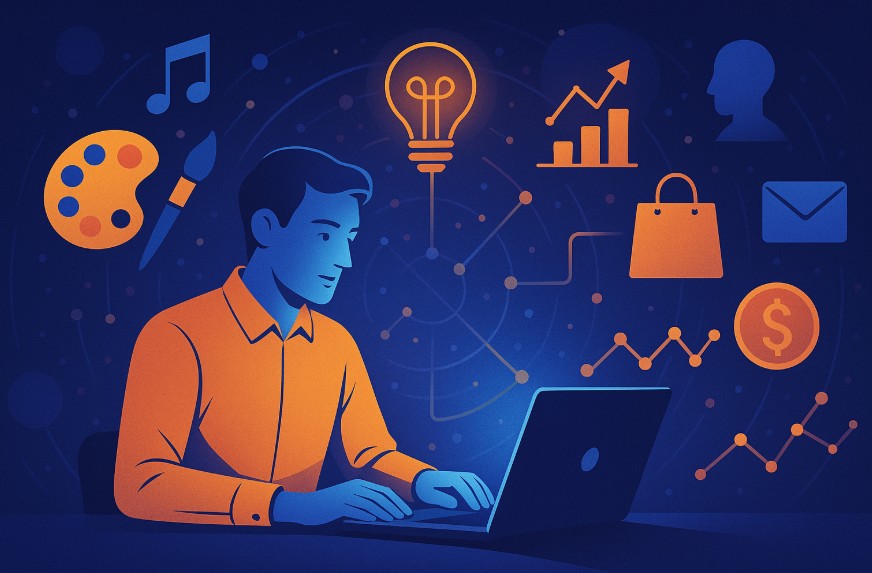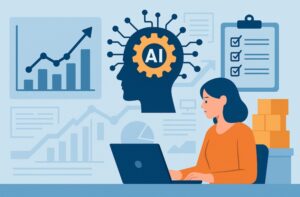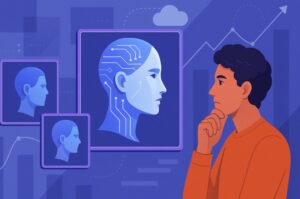
How Generative AI Changing Creativity, Marketing, and Business?

By Ryan Bradman
Generative AI is rapidly becoming one of the most revolutionary technologies of the 21st century. From creating art and music to automating content generation and driving marketing strategies, its impact on creativity, business, and marketing is profound.
By using sophisticated algorithms, generative AI systems can produce original content, analyze vast amounts of data, and optimize decision-making processes, reshaping industries and business practices along the way.
For those interested in how technology intersects with gambling, platforms like https://first.com/learn/casino/what-is-rtp can provide valuable insights into the technicalities of games and how AI might influence the future of gaming experiences.
Generative AI and Creativity: Opening New Doors for Artists and Creators

One of the most exciting applications of generative AI is in the realm of creativity. Artists, writers, musicians, and content creators are using AI to push the boundaries of traditional creative work.
Generative AI enables the creation of art, literature, and music by analyzing existing data and generating new works based on learned patterns. This opens new avenues for artistic expression and redefines the role of creators.
How Generative AI is Impacting Creativity:
| Creative Field | Examples of AI Impact |
| Art and Design | AI tools like DALL·E generate original artwork based on text prompts, enabling artists to explore new visual concepts. |
| Music Composition | AI models like OpenAI’s MuseNet create music compositions in various styles and genres, allowing musicians to experiment with new ideas. |
| Writing and Literature | AI tools like GPT-3 assist writers in creating stories, articles, and poetry by offering suggestions or generating full pieces of text. |
| Film and Animation | AI-driven animation tools can automate parts of the animation process, reducing production time and cost. |
Generative AI tools have made creativity more accessible and efficient. While these AI systems cannot replace human intuition and imagination, they provide creators with a valuable toolset to experiment and innovate.
These developments give artists more time to refine their ideas, while AI handles more repetitive or technical tasks, making the creative process faster and more fluid.
The Role of Generative AI in Marketing: Personalization at Scale
Marketing is another field where generative AI is making significant strides. With the ability to analyze consumer behavior, predict trends, and automate content generation, AI is helping businesses achieve a level of personalization that was previously unimaginable.
By creating tailored experiences for individual consumers, generative AI is reshaping how brands communicate with their audiences.
How Generative AI is Revolutionizing Marketing:
| Marketing Strategy | Impact of Generative AI |
| Content Creation | AI can generate personalized blog posts, product descriptions, and social media content in real-time, saving marketers time and effort. |
| Email Campaigns | AI can write customized email copy for each recipient based on their preferences and previous interactions, driving higher engagement rates. |
| Ad Targeting | By analyzing customer data, AI can help brands create hyper-targeted ads that resonate with specific consumer segments, increasing the effectiveness of campaigns. |
| Customer Interaction | AI-driven chatbots and virtual assistants provide instant, personalized responses to customer inquiries, improving the customer experience. |
Through these applications, generative AI is not only enhancing the efficiency of marketing campaigns but also improving their precision.
As AI systems become more sophisticated, marketers can expect even greater levels of personalization, further streamlining their strategies and improving customer satisfaction.
AI’s Impact on Business Decision-Making and Operations

Beyond creativity and marketing, generative AI is also transforming business operations. From supply chain optimization to automated decision-making processes, AI is helping businesses run more efficiently and cost-effectively.
By processing and analyzing vast datasets at speeds far beyond human capabilities, AI can uncover insights that would otherwise remain hidden, enabling businesses to make informed decisions quickly.
How Generative AI Is Reshaping Business Operations:
| Business Function | Impact of Generative AI |
| Data Analysis | AI can process large datasets to identify trends, forecast demand, and inform business strategy, helping businesses make data-driven decisions. |
| Automation of Repetitive Tasks | AI-powered automation tools handle routine tasks, such as data entry or customer service inquiries, freeing up employees to focus on higher-value work. |
| Supply Chain Management | Generative AI can predict supply chain disruptions and recommend optimal inventory levels, improving overall operational efficiency. |
| Human Resource Management | AI can help with recruitment by analyzing resumes and conducting initial interviews, streamlining the hiring process. |
AI-driven insights and automation are empowering businesses to operate more effectively and make smarter decisions, all while cutting down on operational costs. As AI continues to evolve, it will play a larger role in enhancing productivity, optimizing processes, and reducing inefficiencies across industries.
Ethical and Societal Implications of Generative AI
While the potential benefits of generative AI are immense, it’s important to consider the ethical implications. As AI systems become more autonomous, concerns about their use in creative industries, marketing, and business operations are growing.
Issues such as job displacement, data privacy, and the risk of biased algorithms must be addressed to ensure that AI is used responsibly.
Ethical Challenges with Generative AI:
| Ethical Issue | Potential Concerns |
| Job Displacement | Automation of creative and marketing tasks could displace workers, leading to economic challenges for certain job sectors. |
| Data Privacy | AI systems often require large amounts of personal data to function, raising concerns about how that data is stored and used. |
| Bias in Algorithms | AI systems are only as good as the data they are trained on; biased datasets could lead to unfair or discriminatory outcomes. |
| Intellectual Property | Generative AI’s ability to create original content raises questions about who owns the rights to AI-generated works. |
The ethical use of AI is a topic that requires careful consideration. Governments, businesses, and developers must work together to create policies and guidelines that address these concerns and protect individuals’ rights while fostering innovation.
The Future of Generative AI: What’s Next?

The future of generative AI looks promising, with continued advancements in machine learning and natural language processing.
As AI technology matures, we can expect even more sophisticated tools that will blur the lines between human and machine creativity. Businesses will continue to leverage AI to improve efficiency, enhance customer experiences, and drive innovation across all sectors.
What to Expect in the Coming Years:
- More Advanced AI Models: AI models will become more powerful, capable of handling complex creative tasks and generating even more lifelike content.
- Wider Industry Adoption: As generative AI becomes more accessible, businesses across industries—especially in gaming, marketing, and entertainment, will increasingly incorporate it into their operations.
- AI-Assisted Human Creativity: Rather than replacing human creators, AI will enhance human creativity, providing new tools and ideas to help artists, writers, and musicians achieve their full potential.
The future of generative AI holds exciting possibilities, offering opportunities for both businesses and creators to leverage this technology to reach new heights.
Generative AI is reshaping creativity, marketing, and business in profound ways. By enhancing content creation, enabling more personalized marketing, and streamlining business operations, AI is driving efficiency and innovation across industries.
However, it is essential to address the ethical concerns that come with this technology to ensure it is used responsibly. As AI continues to evolve, its impact on creativity and business will only grow, offering new opportunities for innovation and progress.
Author Profile
- Guest Blogger & Outreach Expert - Interested in Writing Blogs, Articles in Business Niche | News Journalist By Profession in the United Kingdom
Latest entries
 blogJanuary 29, 2026How Price Action Charts Support Short-Term Trading Strategies
blogJanuary 29, 2026How Price Action Charts Support Short-Term Trading Strategies BusinessOctober 24, 2025How MDF Sheets Can Benefit Your Business Projects?
BusinessOctober 24, 2025How MDF Sheets Can Benefit Your Business Projects? FinanceJuly 8, 2025Crypto Liquidity Providers List: Top Providers, Criteria, and Best Practices
FinanceJuly 8, 2025Crypto Liquidity Providers List: Top Providers, Criteria, and Best Practices BusinessJune 27, 2025Modern Travel Tips for Women Exploring Turkey Solo
BusinessJune 27, 2025Modern Travel Tips for Women Exploring Turkey Solo
